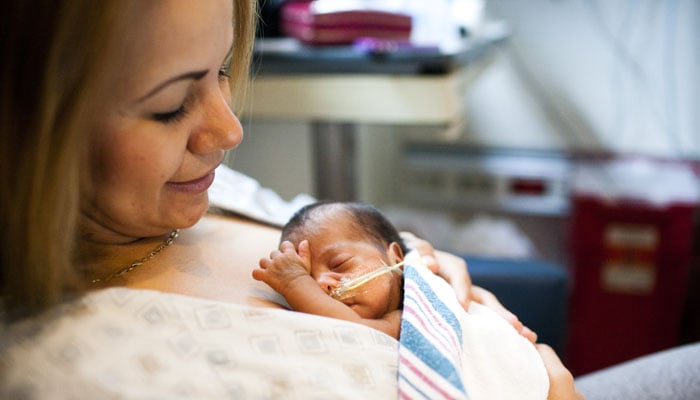World Prematurity Day 2023: Why is kangaroo care vital for preterm babies?
Premature birth and malnutrition put both mother and child at risk for a number of health issues later in life
In every nation, the advancement of the health system and socioeconomic standing are closely related to the preservation of children's health, as a result, premature birth and malnutrition put both mother and child at risk for a number of health issues later in life.
Parents can hold their infant against their naked skin in a technique called "kangaroo care," often referred to as "skin-to-skin care."
It promotes connection between you and your child and aids in the physical and emotional growth of the latter. Kangaroo care has advantages for a woman and the infant.
If the mother and child are both stable, many maternity facilities promote skin-to-skin contact immediately after delivery. Although full-term newborns can get kangaroo care, most preterm babies receiving treatment in a neonatal intensive care unit or special care unit receive it.
Kangaroo care is also appropriate for infants who require oxygen support and breathing assistance while on a ventilator. It should ideally begin as soon as possible after birth or in the first few days.
As long as the infant is healthy and stable, maternity care experts often advise parents to exercise kangaroo care as often and as soon as possible. Kangaroo care benefits babies of all ages, but especially during the period when they're being cared for in a hospital.
The International Centre for Diarrheal Disease Research, Bangladesh (icddr,b) held a press conference last Tuesday, during which the following concerning image of child health in Bangladesh was revealed.
Premature or underweight babies have many difficulties from the start, and many of these babies have little chance of surviving.
Additionally, the state of the world is far from ideal. Approximately 35.3 million of the 135 million infants born in 2020 were underweight or born prematurely. Out of the 2.24 million infant fatalities that year, problems resulting from low birth weight or preterm birth accounted for half (55.4%) of the deaths.
Samina Chowdhury, the previous president of the Obstetrical and Gynaecological Society of Bangladesh (OGSB), emphasised during the conference that, in order to receive proper prenatal care, mothers should preferably see a doctor or other qualified health professional at least eight times.
A qualified medical professional who sees the expectant mother at least once must be involved in providing high-quality prenatal care. In addition, it is important to keep an eye on five critical areas: determining the woman's weight, evaluating her blood pressure, doing urine and blood tests, and offering pregnancy counselling.
The United Nations children's organisation UNICEF stated in 2017 that 446,900 newborns in Bangladesh are born preterm each year. 23,600 of these kids pass away before they turn five. Among the factors contributing to these early births are maternal malnourishment and early marriage.
This emphasises the relationship between the mother's age and health and the chance of having a prematurely born kid who is undernourished. Early marriage raises the likelihood that the kid may be delivered preterm and undernourished. Notably, in South Asia, Bangladesh has the highest rate of child marriage.
The protection of children's health also greatly depends on health sector spending. Just 1% of the nation's GDP is spent on healthcare, compared to 9% in Europe and 18% in the US. Bangladesh continues to have one of the lowest allocation rates for the health sector among South Asian nations.
In terms of preterm births, Bangladesh ranks seventh out of the ten least developed nations in the world, notwithstanding our claims to have improved healthcare.
Given their circumstances, not all moms have the chance to get appropriate prenatal care. In order to reduce child marriages, it is crucial to both enact legal measures and promote societal awareness.
We hope that instead of adopting an "everything is fine" attitude, politicians would act decisively to stop preterm births.
-
What we know about Chris Cornell's final hours
-
5 famous celebrities who beat cancer
-
Oprah Winfrey talks about weight-loss 'tool to manage' health
-
How the world lost Whitney Houston to overdose
-
Late Ozzy Osbourne's 'terribly challenging' life with Parkinson's Disease
-
Emerging health threat: Toxic chemicals found in headphones, raising safety concerns among teens
-
Halsey’s rare health struggle you didn’t know about
-
Angelina Jolie and Brad Pitt mental health struggle amid divorce












